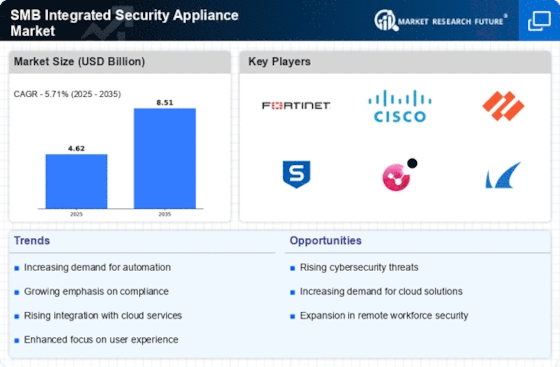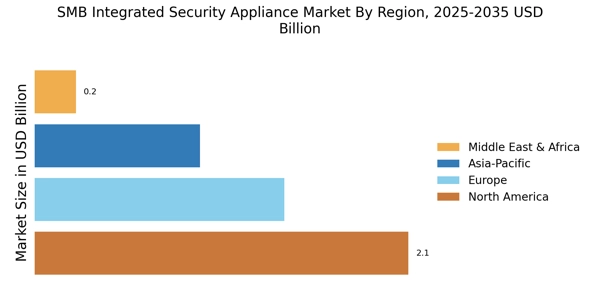Increasing Cyber Threats
The SMB Integrated Security Appliance Market is experiencing a surge in demand due to the escalating frequency and sophistication of cyber threats. Small and medium-sized businesses are increasingly targeted by cybercriminals, leading to a heightened awareness of the need for robust security solutions. In 2025, it is estimated that cybercrime will cost businesses over 10 trillion dollars annually, prompting SMBs to invest in integrated security appliances to safeguard their operations. This trend indicates a growing recognition among SMBs that traditional security measures are insufficient, thus driving the adoption of advanced security technologies. As a result, the SMB Integrated Security Appliance Market is likely to witness significant growth as businesses seek comprehensive solutions to mitigate risks associated with cyber threats.
Adoption of Remote Work Policies
The shift towards remote work has fundamentally altered the landscape of the SMB Integrated Security Appliance Market. As more businesses embrace flexible work arrangements, the need for secure remote access solutions has become paramount. In 2025, it is projected that over 70% of SMBs will have implemented remote work policies, necessitating the deployment of integrated security appliances that can protect sensitive data and ensure secure connections. This trend suggests that SMBs are increasingly prioritizing security measures that accommodate remote work, thereby driving demand for integrated solutions that offer both convenience and protection. Consequently, the SMB Integrated Security Appliance Market is poised for growth as organizations seek to balance productivity with security in a remote work environment.
Regulatory Compliance Requirements
The SMB Integrated Security Appliance Market is significantly influenced by the increasing regulatory compliance requirements imposed on businesses. As data protection regulations become more stringent, SMBs are compelled to adopt security solutions that ensure compliance with laws such as GDPR and CCPA. In 2025, it is anticipated that compliance-related investments will account for a substantial portion of SMB IT budgets, with many organizations prioritizing integrated security appliances that facilitate adherence to these regulations. This trend indicates that SMBs are recognizing the importance of not only protecting their data but also avoiding potential legal repercussions associated with non-compliance. As a result, the demand for integrated security appliances is likely to rise as businesses seek to navigate the complexities of regulatory landscapes.
Technological Advancements in Security Solutions
The rapid pace of technological advancements is a key driver of the SMB Integrated Security Appliance Market. Innovations in artificial intelligence, machine learning, and automation are transforming the capabilities of security appliances, making them more effective and user-friendly. In 2025, it is expected that the integration of AI-driven analytics will enhance threat detection and response times, thereby increasing the appeal of these solutions to SMBs. This trend suggests that as technology continues to evolve, SMBs will increasingly seek integrated security appliances that leverage these advancements to bolster their security posture. Consequently, the SMB Integrated Security Appliance Market is likely to benefit from the ongoing development of cutting-edge security technologies that address the unique challenges faced by smaller organizations.
Growing Demand for Cost-Effective Security Solutions
The SMB Integrated Security Appliance Market is witnessing a growing demand for cost-effective security solutions as budget constraints remain a significant concern for small and medium-sized businesses. In 2025, it is projected that SMBs will allocate a larger portion of their IT budgets to security, yet they will continue to seek affordable options that do not compromise on quality. This trend indicates that vendors in the SMB Integrated Security Appliance Market must focus on providing scalable and flexible solutions that cater to the financial limitations of these businesses. As a result, the market is likely to see an increase in the availability of integrated security appliances that offer robust protection at competitive price points, thereby appealing to a broader range of SMBs.


















